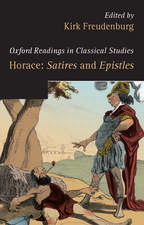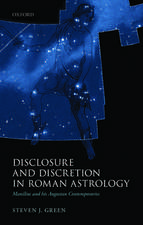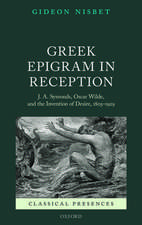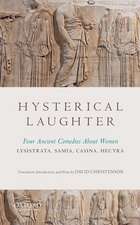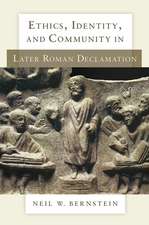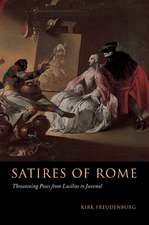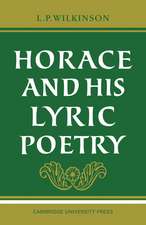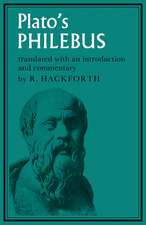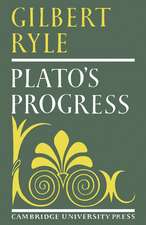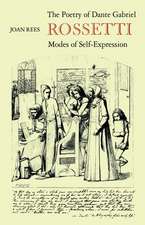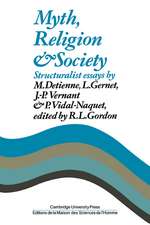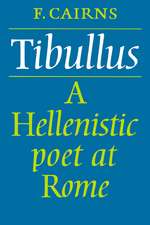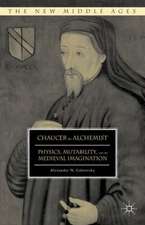The Cambridge Companion to Roman Satire: Cambridge Companions to Literature
Editat de Kirk Freudenburgen Limba Engleză Paperback – 11 mai 2005
| Toate formatele și edițiile | Preț | Express |
|---|---|---|
| Paperback (1) | 343.82 lei 6-8 săpt. | |
| Cambridge University Press – 11 mai 2005 | 343.82 lei 6-8 săpt. | |
| Hardback (1) | 644.23 lei 6-8 săpt. | |
| Cambridge University Press – 11 mai 2005 | 644.23 lei 6-8 săpt. |
Din seria Cambridge Companions to Literature
-
 Preț: 110.86 lei
Preț: 110.86 lei -
 Preț: 309.36 lei
Preț: 309.36 lei -
 Preț: 185.99 lei
Preț: 185.99 lei -
 Preț: 156.72 lei
Preț: 156.72 lei -
 Preț: 158.77 lei
Preț: 158.77 lei -
 Preț: 209.16 lei
Preț: 209.16 lei -
 Preț: 208.69 lei
Preț: 208.69 lei -
 Preț: 208.69 lei
Preț: 208.69 lei -
 Preț: 201.40 lei
Preț: 201.40 lei -
 Preț: 200.68 lei
Preț: 200.68 lei -
 Preț: 208.22 lei
Preț: 208.22 lei -
 Preț: 201.59 lei
Preț: 201.59 lei -
 Preț: 184.35 lei
Preț: 184.35 lei -
 Preț: 185.84 lei
Preț: 185.84 lei -
 Preț: 158.77 lei
Preț: 158.77 lei -
 Preț: 239.88 lei
Preț: 239.88 lei -
 Preț: 237.88 lei
Preț: 237.88 lei -
 Preț: 240.02 lei
Preț: 240.02 lei -
 Preț: 200.28 lei
Preț: 200.28 lei -
 Preț: 252.75 lei
Preț: 252.75 lei -
 Preț: 208.46 lei
Preț: 208.46 lei -
 Preț: 160.00 lei
Preț: 160.00 lei -
 Preț: 207.96 lei
Preț: 207.96 lei -
 Preț: 205.65 lei
Preț: 205.65 lei -
 Preț: 215.54 lei
Preț: 215.54 lei -
 Preț: 162.90 lei
Preț: 162.90 lei -
 Preț: 184.64 lei
Preț: 184.64 lei - 8%
 Preț: 537.53 lei
Preț: 537.53 lei -
 Preț: 159.81 lei
Preț: 159.81 lei -
 Preț: 192.65 lei
Preț: 192.65 lei -
 Preț: 240.99 lei
Preț: 240.99 lei -
 Preț: 157.95 lei
Preț: 157.95 lei -
 Preț: 192.65 lei
Preț: 192.65 lei -
 Preț: 157.71 lei
Preț: 157.71 lei -
 Preț: 193.14 lei
Preț: 193.14 lei -
 Preț: 275.99 lei
Preț: 275.99 lei -
 Preț: 177.47 lei
Preț: 177.47 lei -
 Preț: 208.94 lei
Preț: 208.94 lei -
 Preț: 208.94 lei
Preț: 208.94 lei - 8%
 Preț: 529.45 lei
Preț: 529.45 lei -
 Preț: 228.89 lei
Preț: 228.89 lei -
 Preț: 275.66 lei
Preț: 275.66 lei -
 Preț: 138.56 lei
Preț: 138.56 lei -
 Preț: 160.22 lei
Preț: 160.22 lei -
 Preț: 158.94 lei
Preț: 158.94 lei -
 Preț: 208.88 lei
Preț: 208.88 lei -
 Preț: 275.17 lei
Preț: 275.17 lei -
 Preț: 208.22 lei
Preț: 208.22 lei
Preț: 343.82 lei
Nou
Puncte Express: 516
Preț estimativ în valută:
65.79€ • 68.69$ • 54.33£
65.79€ • 68.69$ • 54.33£
Carte tipărită la comandă
Livrare economică 15-29 aprilie
Preluare comenzi: 021 569.72.76
Specificații
ISBN-13: 9780521006279
ISBN-10: 0521006279
Pagini: 374
Ilustrații: 1 b/w illus.
Dimensiuni: 153 x 229 x 24 mm
Greutate: 0.59 kg
Ediția:New.
Editura: Cambridge University Press
Colecția Cambridge University Press
Seria Cambridge Companions to Literature
Locul publicării:Cambridge, United Kingdom
ISBN-10: 0521006279
Pagini: 374
Ilustrații: 1 b/w illus.
Dimensiuni: 153 x 229 x 24 mm
Greutate: 0.59 kg
Ediția:New.
Editura: Cambridge University Press
Colecția Cambridge University Press
Seria Cambridge Companions to Literature
Locul publicării:Cambridge, United Kingdom
Cuprins
Introduction: posing for the companion: Roman satire Kirk Freudenburg; Part I. Satire as Literature: 1. Rome's first 'satirists': themes and genre in Ennius and Lucilius Frances Muecke; 2. The restless companion: Horace, Satires 1 and 2 Emily Gowers; 3. Speaking from silence: the Stoic paradoxes of Persius Andrea Cucchiarelli; 4. The poor man's feast: Juvenal Victoria Rimell; 5. Citation and authority in Seneca's Apocolocyntosis Ellen O'Gorman; 6. Late arrivals: Julian and Boethius Joel Relihan; 7. From turnips to turbot: epic allusion in Roman satire Catherine Connors; 8. Sleeping with the enemy: satire and philosophy Roland Mayer; 9. The satiric maze: Petronius, satire and the novel Victoria Rimell; Part II. Satire as Social Discourse: 10. Satire as aristocratic play Thomas Habinek; 11. Satire in a ritual context Fritz Graf; 12. Satire and the poet: the body as self-referential symbol Alessandro Barchiesi and Andrea Cucchiarelli; 13. The libidinal rhetoric of satire Erik Gunderson; 14. Roman satire in the sixteenth century Colin Burrow; 15. Alluding to satire: Rochester, Dryden, and others Dan Hooley; 16. The Horatian and the Juvenalesque in English letters Charles Martindale; 17. The 'presence' of Roman satire: modern receptions and their interpretative implications Duncan Kennedy; Conclusion. The turnaround: a volume retrospect on Roman satires John Henderson.
Recenzii
'Satire, perhaps more than any other genre, needs these companions, as it is a long, winding, branching road that sometimes blurs into obscurity. … the writings pull no punches, are often in the vernacular, and are direct in speech like satire itself. … this volume proves to be a worthy companion. Each author hands the traveller on to the next author, never isolating the reader but always providing connections by which to find a way back and to make the current scenery familiar.' Bryn Mawr Classical Review
'When travelling a long and varied road from its murky beginnings to its uncertain end one hopes for knowledgeable and interesting companions to lead one through the mud, side roads, and indiscernible paths. The Cambridge Companion to Roman Satire provides such companions … [the book's] scope is huge. Many of the writings are general and basic enough for the novice adventurer while others … are specific and innovative enough for the specialist or seasoned traveller. In general, the writings pull no punches, are often in the vernacular, and are direct in speech like Satire itself … The restless companion: Horace: Satires 1 and 2 by Emily Gowers … masterfully provides a basic framework within which to understand better Horace and his writings … Cucchiarelli has taken a very dense, confusing author [Persius] and explained lucidly the reasons for his difficulty … Citation and authority in Seneca's Apocolocyntosis by Ellen O'Gorman. This is one of the most titillating chapters in the corpus … Late arrivals: Julian and Boethius … This essay is very well written by the leading authority in this area and assumes … that most of us have not read … these texts and certainly never fully appreciated the satiric elements in them … this volume proves to be a worthy companion. Each author hands the traveller on to the next author, never isolating the reader but always providing connections by which to find a way back and to make the current scenery familiar.' Martha Habash, Creighton University
'The internationality is delightful for still, far too rarely, do researchers coming from different linguistic areas meet in satire studies … a reliable guide and comprehensive introduction to the subject.' Arctos
'Students of satire will be glad to have this new volume in their hands. It should inspire the field to push still further, so that the genre is fully recognized as an important donor to literature and culture …' Journal of Roman Studies
'… the editor and the contributors to this volume while reaching for the star do not underestimate the difficulty of reading Roman satire and this is one of the main strengths of the book. Lector intende: this companion will delight you on your journey.' Classics Ireland
'When travelling a long and varied road from its murky beginnings to its uncertain end one hopes for knowledgeable and interesting companions to lead one through the mud, side roads, and indiscernible paths. The Cambridge Companion to Roman Satire provides such companions … [the book's] scope is huge. Many of the writings are general and basic enough for the novice adventurer while others … are specific and innovative enough for the specialist or seasoned traveller. In general, the writings pull no punches, are often in the vernacular, and are direct in speech like Satire itself … The restless companion: Horace: Satires 1 and 2 by Emily Gowers … masterfully provides a basic framework within which to understand better Horace and his writings … Cucchiarelli has taken a very dense, confusing author [Persius] and explained lucidly the reasons for his difficulty … Citation and authority in Seneca's Apocolocyntosis by Ellen O'Gorman. This is one of the most titillating chapters in the corpus … Late arrivals: Julian and Boethius … This essay is very well written by the leading authority in this area and assumes … that most of us have not read … these texts and certainly never fully appreciated the satiric elements in them … this volume proves to be a worthy companion. Each author hands the traveller on to the next author, never isolating the reader but always providing connections by which to find a way back and to make the current scenery familiar.' Martha Habash, Creighton University
'The internationality is delightful for still, far too rarely, do researchers coming from different linguistic areas meet in satire studies … a reliable guide and comprehensive introduction to the subject.' Arctos
'Students of satire will be glad to have this new volume in their hands. It should inspire the field to push still further, so that the genre is fully recognized as an important donor to literature and culture …' Journal of Roman Studies
'… the editor and the contributors to this volume while reaching for the star do not underestimate the difficulty of reading Roman satire and this is one of the main strengths of the book. Lector intende: this companion will delight you on your journey.' Classics Ireland
Descriere
Explores the development of Roman satire in antiquity and of its reception in later centuries.


